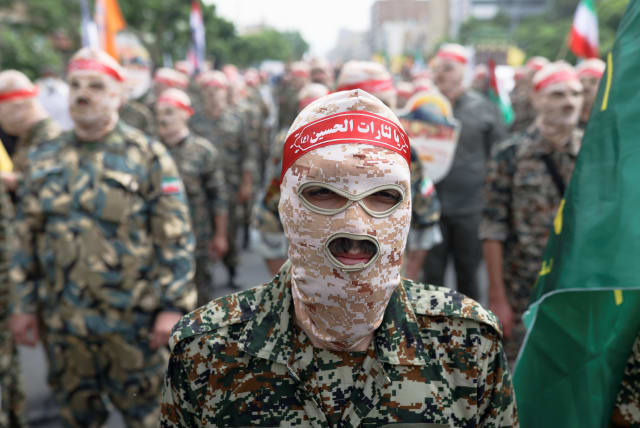Iranian president provided at least $6 billion to IRGC amid protests - report

Dissident hackers leaked a letter from the IRGC asking Iran's president for help suppressing protests in universities.
The Islamic Revolutionary Guard Corps (IRGC) received at least $6 billion from the Iranian government and Iranian President Ebrahim Raisi pushed to provide them with even more amid the protests that swept Iran last year, according to documents leaked by the GhyamSarnegouni ("Rise to Overthrow") dissident hacker group this week.
The leaked documents included a letter from the chief of staff of the Iranian Armed Forces, Mohammad Bagheri, to Raisi noting that, because of the nationwide protests, the IRGC and police needed at least 10 trillion tomans (equivalent to about $2.4 billion) in immediate funding, including funds for vehicles, military equipment, clothing and operational costs.
Bagheri additionally noted that a budget of about $6 billion had already been allocated for the IRGC but added that this budget was not expected to be available for at least a year.
An additional leaked document from the dissident group is a letter from Raisi to the head of Iran's Planning and Budget Organization Masoud Mirkazemi, in which Raisi requests that Mirkazemi fulfill Bagheri's request for additional funding "promptly."
The group leaked a third document as well, a letter from IRGC Commander-in-Chief Hossein Salami to Raisi, asking for help suppressing protests in universities, including funds for physical security and cybersecurity infrastructure and CCTV cameras, among other matters.
The group, which is reportedly affiliated with The People's Mujahedin Organization of Iran (the Mujahedin-e-Khalq or MEK) dissident group, has made repeated claims of conducting cyber attacks and leaking secret documents in the past few months.
In May, the group said it had defaced websites affiliated with the Iranian presidency with photos of leaders of the MEK and had managed to hack servers belonging to the presidency containing confidential files.
Last June, the group claimed to have hacked into and deactivated thousands of cameras and over a hundred websites and services belonging to the Tehran Municipality. At the time, the head of the Tehran City Council blamed the Mossad and the MEK for the cyberattack.
Hackers leak document revealing female protester was strip searched in prison
Additionally, on Tuesday, an anti-regime hacker group called Edalat Ali leaked what it said was correspondence between the judiciary and deputy prosecutor in Tehran confirming that a female political prisoner had been strip-searched "in several stages" and had been "treated with disrespect and mistreated" by security officers late last year.
In September, protests swept Iran after Mahsa Amini was arrested by "morality police" officers in Tehran for allegedly incorrectly wearing her hijab, with her family saying that she was beaten by the officers in the van that brought her to the police station.
At the police station, she collapsed and was brought to the hospital where she later died. Her relatives have told foreign media that they were kept largely in the dark about the situation.
The protests continued for months, slowing earlier this year. In recent weeks, sporadic protests have renewed amid a reported intensification of attacks and pressure by Iranian authorities on the families of killed protesters.
Earlier this month, Pouya Molaeirad, a relative of Kian Pirfalak - a 9-year-old boy who died during the protests last year, was shot and killed by Iranian authorities following a confrontation at Pirfalak's burial site in the village of Parchestan-e Gurui in the Khuzestan Province, according to Radio Farda.
Pirfalak was one of several residents of Izeh killed when Iranian government forces shot toward protesters in the city in November. While Iranian officials claimed that "terrorists" conducted the shooting, local residents, including Pirfalak's mother, said that government forces were behind the massacre.
Additionally, earlier this month, the relatives of killed protesters were arrested after visiting Amini's tomb to protest reported efforts by Iranian authorities to block public access to the tomb.
The Critical Threats Project (CTP) at the American Enterprise Institute noted in an update earlier this month that "Iranian security forces are attempting to discourage citizens from holding commemoration ceremonies for killed Mahsa Amini protesters."
The CTP noted that the renewed violence against civilians could revive anti-government protests in Iran.
Jerusalem Post Store
`; document.getElementById("linkPremium").innerHTML = cont; var divWithLink = document.getElementById("premium-link"); if (divWithLink !== null && divWithLink !== 'undefined') { divWithLink.style.border = "solid 1px #cb0f3e"; divWithLink.style.textAlign = "center"; divWithLink.style.marginBottom = "15px"; divWithLink.style.marginTop = "15px"; divWithLink.style.width = "100%"; divWithLink.style.backgroundColor = "#122952"; divWithLink.style.color = "#ffffff"; divWithLink.style.lineHeight = "1.5"; } } (function (v, i) { });

